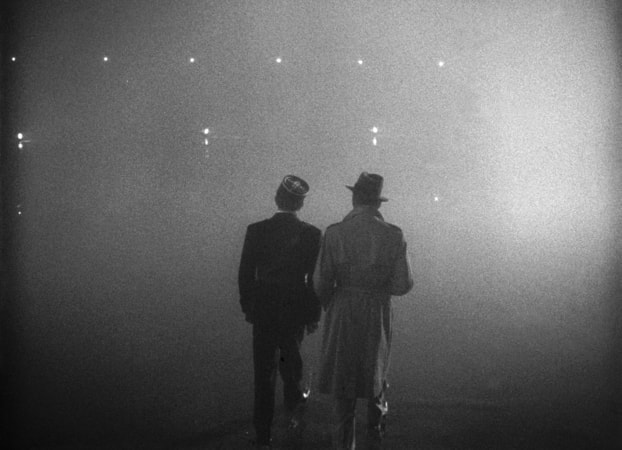Casablanca
 |
| © Warner Bros. Entertainment Inc. All rights reserved. |
Moral: No one is neutral.
For the first post in this blog, I want to start off with an undeniable classic.
Casablanca.
AFI’s #3 highest rated movie of all time. Quite frankly, this movie doesn’t need any introduction, so let's get started.
Casablanca’s story structure is great to learn from, particularly act one. Act one immediately sets the scene. Two soldiers are said to be murdered for documents, a man is shot for having expired papers, and a friendly stranger turns out to be a pickpocket. Then we see Rick’s tavern. Even before meeting Rick, we see everyone inside scrambling and scheming to find a way out of Casablanca. Casablanca is dangerous. This is also a sort of metaphor. Just like all the refugees stuck in Casablanca, Rick is also stuck. He is stuck in the past.
Next we meet Rick, and our plot begins. Rick is given Letters of Transit. Those Get out of Casablanca free cards are key factors. This is Chekov’s gun. Rick is given the letters and by the end of the movie he must decide how to use them.
We also meet Yvonne. A woman who throws herself at Rick, but he stubbornly rejects her. This is an introduction to Rick’s troubled past love. Which of course, makes up most of the next act in the movie. We even hear Louis say “Rick is completely neutral about everything. And that takes in the field of women, too.” This ties directly into our theme.
In act one we also hear Rick’s tagline, “I stick my neck out for nobody.” This line also goes right into our story’s moral. No one is neutral. Rick says he remains neutral when really he does not. He will be overwhelmed to take action. When Rick sits down with Major Strassor, they have a whole conversation where Rick tries to play himself off as politically passive, even as they list off the history of his political activity.
In act one we also hear Rick repeatedly turn down offers to share a drink with customers. This is something he simply will not do… until Ilsa arrives.
All of this is packed into Act I. Everything we see up until this point is vital to understand going into the next steps of the story. Few stories are able to load this much information into the first act so simply. By the end of this story, it all comes back around, which is a necessary trait of any story. There is no time wasted and no unnecessary details. Any unneeded information in a story becomes a distraction.
Now we get to act two, which I will go through a little faster. Enter Ilsa. Rick’s former lover. The one who stood him up, waiting at a train station. This is a fantastic example of Personal Hell; putting characters in the last situation they would ever want to be in. Rick surely hates to see his ex-girl in his saloon. The famous line even says, “of all the gin joints in all the towns in all the world, she walks into mine.”
Ilsa is trying to flee from the Germans with her husband. She begs Rick for help, but, pleading neutrality, he refuses. As an audience member, we know he can help, but he is stuck in the past.
In act two we also meet Victor Laszlo. Victor is a clone of Rick. Victor comes to Casablanca and should have one goal: escape. However Victor is not a neutral man. He is active in his rebellion against the Germans. Even though Victor’s main objective is to escape the Nazis, he still takes the time to attend secret meetings. His interest in the war is more powerful than his own escape. Even though the German spies watch Victor, he is still willing to stick his neck out for others. As we’ve mentioned already, this is quite the opposite of Rick.
I could say more, but I don’t think I need to; we know what happens. Rick sticks his neck out for Ilsa. Rick gives her the Letters of Transit. Rick even sells off his tavern. He is no longer stuck in the past. Unlike the beginning of the story, Rick is active, not passive. No one is neutral.
Even Louis, the corrupt police captain, picks a side and supports Rick after helping Ilsa escape by murdering the Major. Then Louis and Rick walk away from Casablanca together. Rick is no longer “stuck” in Casablanca.
This all goes back to how well the first act is structured. The tone is set: Casablanca is dangerous. This holds true the rest of the story. Rick starts neutral, but ends up taking risks for others. The Letters are introduced. In the end Rick gives those up to help Ilsa escape. We see that Rick is stuck in the past, trying to be neutral, and has a troubled love life. All of this changes after confronting Ilsa the rest of the story. Rick doesn’t drink with his customers. Then he drinks a lot.
Everything that is introduced in act one plays a part later on. Characters’ habits are changing. Each character has an important role. Rick learns to stick his neck out for somebody.
In conclusion: don’t be neutral. Don’t be passive. And when writing a story, a strong first act is necessary to hold up the entire plot.
There is a lot going on in Casablanca behind the scenes. A film that preaches political activity in a war time is powerful to say the least. But nearly 80 years later the power still resonates. Good stories last forever
Comments
Post a Comment